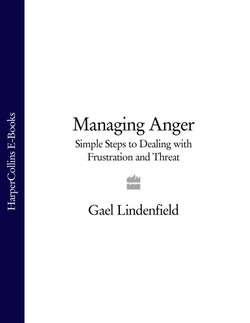Читать книгу Managing Anger: Simple Steps to Dealing with Frustration and Threat - Gael Lindenfield, Gael Lindenfield - Страница 23
Anger and Self-Esteem
ОглавлениеOur attitude to anger can affect the way we think about ourselves, and therefore it has the power to affect our self-esteem and self-confidence. In our culture, because anger still has such a negative aura for many people, even feeling the emotion, let alone expressing it, can damage self-esteem. I often hear people admitting that they keep even minor feelings of irritation well-hidden because they are ashamed of them.
As most people’s ideas of ‘goodness’ include benevolence, tolerance, generosity, kindliness and affability, angry (‘negative’) feelings are often banished to the private worlds of fantasy and dreams. These can, of course, be very natural safe healing abodes for difficult feelings – as long as we do not hate ourselves for actually experiencing them there. But how good are we likely to feel about ourselves when we are carrying around images in our heads of the awful things we would like to do, or dreamed last night of doing, to get our own back on someone who has hurt us? Certainly very many of my clients report that they have found it excruciatingly difficult to ‘confess’ their angry fantasies to me, because they are convinced that when they do, I will see them ‘for what they really are’ and I am bound to reject them out of fear and loathing.
Similarly, many people have told me how they are ashamed to admit that they are gaining vicarious satisfaction from books, films and plays where anger is expressed, sometimes quite horrifically and destructively. They are worried that their interest proves that at some deep level they are just as evil and violent as the fictional characters, and that if they were to release their anger they would be just as destructive themselves.
Many other people have their self-esteem damaged because they have actually experienced disapproval and rejection in direct response to the expression of their anger. If this happens frequently, it can make them feel very despairing about themselves, because they begin to wonder if they will ever be capable of loving or being loved, or of achieving success.
There are two main reasons why the expression of anger can be followed by disapproval and rejection:
1 The recipients themselves have such low self-esteem or are so stressed that they are not able to cope with the anger which is being directed at them.
2 The anger has been expressed in a threatening or unjust manner.
Identifying which of these two reasons is involved is vitally important, because the first is neither the fault nor the responsibility of the angry person (unless, perhaps, the other person is in our care, e.g. a child). But the second most certainly is our business and we do have the power to do something about it – we can learn to manage our anger more assertively! If we do, we will find that not only will our relationships improve but so will our self-esteem.
